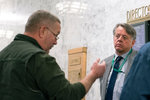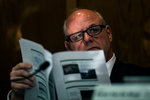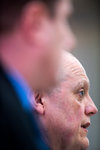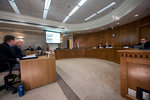





OLYMPIA — A case of mysterious missing fish has state Sen. Kirk Pearson frustrated, and he is not alone.
On Thursday, the Republican senator from Monroe, who acts as the chairman of the Natural Resources and Parks Committee, listened to a presentation from head brass of the Washington Department of Fish and Wildlife and engaged in a back and forth dialogue in an effort to ascertain exactly how a half million fish can go missing on the WDFW’s watch.
He also wanted to know why it took more than six months and extraordinary effort by the press, in this case The Chronicle, for that fact to come to light.
The fish in question were summer steelhead and cutthroat trout smolt from the Cowlitz River trout hatchery that came up missing last May and June when the WDFW went to release them for their multiple year sojourn to the ocean and back.
Rumors of the massive loss, which accounts for about 70 percent of the intended summer smolt stock, were rampant for months, but official confirmation was slow to trickle down from WDFW officials. Inquiries from The Chronicle that began in 2016 were ignored, deflected or passed along the chain of command to Columbia River Fishery Policy Coordinator Cindy LeFleur, who initially neglected to return numerous phone calls to her office.
Despite the formal setting of a hearing at the state capitol campus and the presence of at least two other senators on the committee to help with the probing line of questioning, Pearson and a crowd of angry anglers in the audience were left wanting more concise and direct answers.
“To tell you the truth, I wasn’t satisfied. I had high hopes for this new director and it's kind of like ‘cover our backside,’” Pearson said on Friday. “I’m not seeing any leadership at the top. It would be nice if somebody said, ‘I’m sorry, we screwed up.’ But instead it's typical bureaucracy.”
The new WDFW director mentioned by Pearson is Jim Unsworth, who came to Washington from Idaho in January 2015 after previously serving as the Idaho Fish and Game director.
On Thursday at the hearing, Unsworth was flanked by Kelly Cunningham, assistant deputy director of the WDFW, and Eric Kinne, hatchery reform coordinator for the WDFW.
Both during the meeting and after, Unsworth deferred most questions to his staff whether they came from lawmakers, the press or the public.
Cunningham fielded most of the questions during the hearing and delivered a large portion of the WDFW presentation about the workings of the Cowlitz River trout hatchery.
He began the presentation by solemnly noting, “We do not have a very compelling story to tell.”
The presentation went on to highlight much of what was already known. The bulk of the blame for the fish loss was placed on hungry birds that target the fish while they were being reared in large pools at the hatchery.
Due to what was dubbed prohibitive cost, those pools are not sufficiently covered with bird-proof netting and are not expected to receive any upgrades for at least the next three to six years.
“The sheers size of the lakes makes it impossible for staff to estimate the number of smolt being reared at any one time,” explained Cunningham, who estimated that improved netting would cost roughly $500,000. “The current infrastructure severely limits our ability to fully net the lakes.”
Additionally, disease was blamed for the loss of about 100,000 fish before they were acclimated into the rearing pools. The WDFW also noted that a problem with one of the hatchery pools forced the smolt to be crammed into just two pools rather than the typical three. It was noted that the increased density could have led to an uptick in mortality rate for the smolt through bird predation and other means.
Lastly, the WDFW addressed their fish counting machine, which they have noted to be consistently inaccurate despite what has been described as repeated calibration efforts.
In a previous story in The Chronicle, the WDFW’s LeFleur said, “I don’t think it’s reliable, like if two fish go through at the same time. The counting equipment just isn’t perfect.”
She also noted that lake debris such as sticks and grass sometimes wind up being incorrectly counted as fish.
That excuse did not sit well with Sen. Pearson, who pointedly asked if the WDFW is using known faulty equipment to keep track of fish numbers at all of the hatcheries in the state.
Kinne fielded that question by noting that in “most of our facilities we don’t use counters like this.”
It was explained that once the fish are plopped in the pools in November or December, there is really no way to keep track of their numbers until it is time to release them.
“We have historically used this counter since 2008,” said Kinne. “They are as accurate as we can get.”
Pearson then interrupted the proceedings to ask for clarification on the comment from LeFleur that water debris can wind up being counted as fish. The WDFW confirmed that to be true.
Cunningham added that because of the known inaccuracies of the counting machine, “there very well could be more fish released than were counted, but as Sen. Pearson noted, some of those could be sticks.”
Among the fixes proposed by the WDFW until a complete overhaul of the Cowlitz River trout hatchery can be completed were smaller meshed netting for the ponds and increased bird hazing efforts that could include lethal action. However, there was no solution offered for the innaccurate fish counter.
Those answers and proposed stopgap solutions did little to cool the fire of Pearson, who noted that because of lawsuits and mismanagement in recent years many fisheries and angling prospects have been lost around the state.
“There is great frustration. There were a lot of people after the hearing from the Cowlitz who were eager to share a lot of other facts about the department,” Pearson told The Chronicle. “They are not doing a great job, and I am very concerned about the management.”
Pearson noted that he has received numerous “interesting emails” on the management of the Cowlitz River from Southwest Washington residents and he plans to meet with concerned citizens and fishing groups around the state in the near future in order to get a better handle on the situation as a whole.
“I think right now there is a lot of anger in your county and among Southwest Washington anglers. It’s like you run your Labrador through that field and flushed a bunch of stuff up from that field. We’ve flushed a bunch of stuff up here,” said Pearson, who expressed concern that capable WDFW employees wind up caught in the dragnet of controversy. “Things are really in flux right now.”
Aside from the issue of mismanagement, Pearson is also concerned about the economic impact that the lost fish will have on Southwest Washington. The summer steelhead fishery is one of the most popular fisheries in the state, and those lost steelhead would have begun returning to the Cowlitz River in the summer of 2018, while the cutthroat trout would have started showing up this summer.
“The recreational value alone of a half million steelhead and cutthroat, if you could put that into dollars for the revenue that could bring in for the state, my goodness,” said Sen. Pearson, who noted that many of the constituents from his district make the trek south in order to try their luck on the Cowlitz River. “We’re going to lose some good, great opportunities. There’s going to be less fish.”
That assertion is not one that the WDFW was eager to concede. They contend that the actual return numbers are largely dependant on marine survival rates, so if the smolt that were released have a particularly good year out at sea, the returning numbers may not be as bad as many people fear.
However, the expected return for released smolt usually hovers around 1 percent, with some years approaching zero and other years climbing upward of 5 percent. With 70 percent of those smolt taken off the top, it would take a minor miracle for the return numbers of 2018-19 to not take a substantial hit.
When confronted with those facts, Unsworth relented a bit, noting that, “worst case scenario, it could be really bad. You have a scenario where you have preferable marine conditions and survival rates and the return numbers might not be as bad.”
That type of roundabout answer did not sit well with Pearson.
“I’m just a small town guy, but I do know when they are giving us a line,” said Pearson. “I can’t live with these stock excuses. I’ve been here 17 years in the Legislature and I’m just really frustrated with the lack of leadership and the lack of answers.”
He added that, “The tribes should be pissed off because they are co-managers here.”
For his part, Unsworth expressed concern at the amount of time that lapsed between the discovery of the missing fish and when word was passed along to the public and the Legislature.
“We want to provide straight answers,” said Unsworth. “Certainly these aren’t things that you hide.”
Cunningham agreed with his boss, noting during his presentation that, “In my perspective our biggest failure on this issue is our failure to timely communicate on this substantial loss of fish.”
On that particular issue, Pearson finally found common ground with the WDFW officials. He noted that he had heard rumors of the lost fish through unofficial channels but noted he had not heard from anyone in the WDFW until mid-January.
“The day before (The Chronicle) story came out they called us and that’s what really irritated me,” said Sen. Pearson. “You know we don’t like being misled or lied to.”
The senator has vowed to keep pursuing the issue of the approximately 514,000 lost smolt on the Cowlitz River as well as WDFW mismanagement issues in general. At the end of the hearing, he extended an invitation to the WDFW officials to return to the committee any time in order to further make their case. He said that depending on what emerges from his talks with anglers around the state in coming weeks, he may be issuing them a formal request to sit in front of the Naturals Resources and Parks Committee sooner rather than later.
“I don’t think we’ve really scratched the surface yet on this issue,” said Pearson.
During the hearing, Unsworth noted that citizens will be provided an opportunity for public comment during a set of Fish and Wildlife Commission meetings scheduled for March 17-18 in Olympia.
Pearson’s office can be reached by email at Jess.Honcoop@leg.wa.gov. Jim Unsworth can be contacted by email at Jim.Unsworth@dfw.wa.gov.